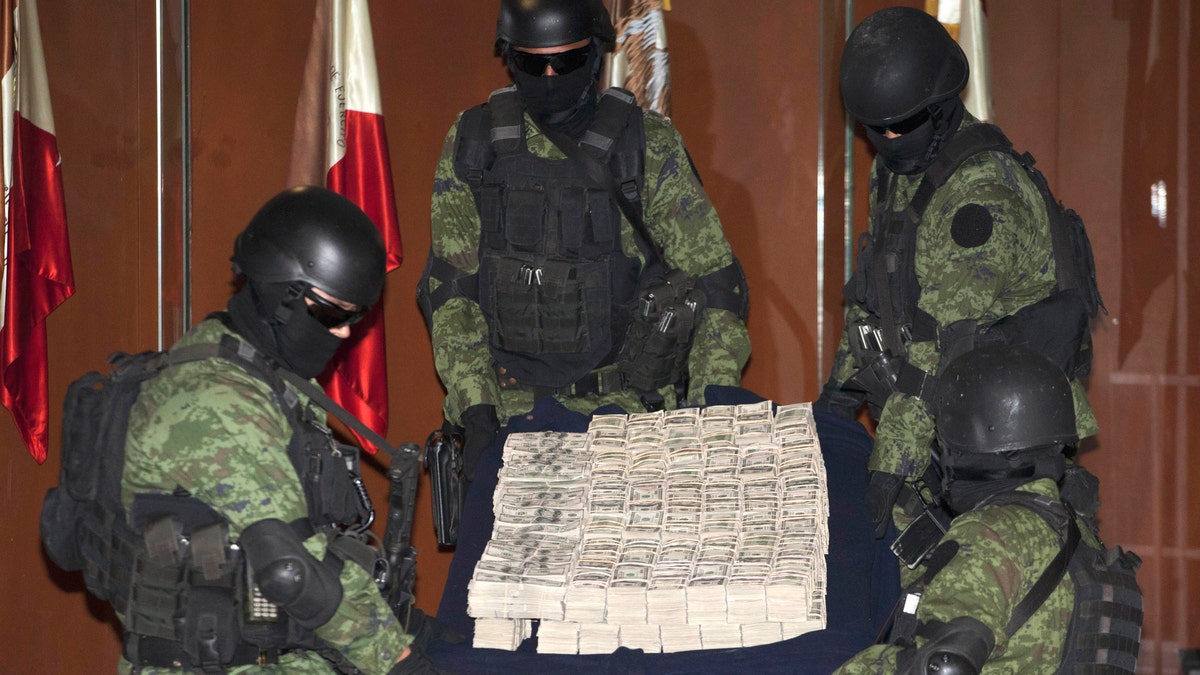
(AP Photo/Eduardo Verdugo) (AP2011)
Federal prosecutors in Mexico plan to open an investigation into a recorded telephone conversation in which a suspected drug cartel boss allegedly threatens people in a western Mexican town to vote in favor of one candidate.
In the conversation the reputed drug boss reportedly also claims a rival cartel financed the campaign of another party.
The accusations would be the gravest instance yet of drug cartel penetration in Mexican politics.
Gubernatorial candidates in the Nov. 13 elections in the state of Michoacán have already claimed there was drug cartel interference in the vote. Michoacán is considered one of Mexico's most narco-dominated states.
But nobody has yet ascertained the origin or veracity of a recording made public Tuesday by local media, in which a voice identified as Horacio Morales Baca, a purported leader of the flagging La Familia cartel, is heard calling residents of the town of Tuzantla prior to the election and telling them to vote for the mayoral candidate of the former ruling Institutional Revolutionary Party, known as the PRI.
We cannot allow organized crime to decide at the ballot box.
Morales Baca says on the tape that anyone who voted for the Democratic Revolution Party, or PRD, would face bloody reprisals.
"If anybody votes for the PRD, a relative of theirs will be killed," the voice is heard saying. "Anybody who tells ... anybody from the PRD that I called and told you this, and their is some kind of legal challenge in Morelia (the Michoacán state capital), that person's house will be burned with their family inside," the voice is heard saying. The PRI candidate won the mayorship, and a PRI candidate won the governorship.
But the voice also says that the rival — and largely dominant — Knights Templar cartel had been financing the campaign of Silvano Aureoles, the PRD's unsuccessful candidate for governor.
"The PRD candidate for governor, Silvano, the Knights Templar are supporting him," the voice says. "The head of the Knights Templar gave $2 million, and they are helping him with a lot of things."
Both parties mentioned in the tape denied the allegations.
A statement issued by his office said Aureoles "categorically denies having received any sort of support from groups that operate outside the law," but claimed that with the tapes "it is proved that there was a call from a criminal gang for people to vote for the candidate of the PRI."
PRI candidate Fausto Vallejo, who won the governorship, denied any links with organized crime. "If any party acted within the law and with few funds, it was us."
"There is no pact, there is no agreement, there is no truce with the criminals," Vallejo told a meeting after he was declared winner.
A statement from the federal Attorney General's Office did not offer any judgment on the authenticity of the tape, saying simply that it "will investigate those acts that could represent federal crimes, and in accordance with its duties, will carry out investigations of the possible participation of member of organized crime in the electoral process."
Even before news of the tape leaked out, all of the governor candidates or their parties had complained that mayoral candidates from their parties had received threats in some towns. One of the losing candidates is Luisa María Calderón, President Felipe Calderón's sister, who ran for the president's conservative National Action Party.
On Tuesday, Josefina Vázquez Mota, the leading contender for National Action's 2012 presidential nomination, said the party had to be taken to prevent narco-penetration of national politics.
"We cannot allow organized crime to decide at the ballot box," Vázquez Mota told local media. "We have to join ranks to confront this threat, this attempt by organized crime to vote with bullets, and inhibit democratic voting."
Also Tuesday, the Mexican army said it seized $15.3 million in bundles of cash believed to belong to members of the Sinaloa drug cartel.
Army spokesman Gen. Ricardo Trevilla said soldiers found the piles of U.S. bills inside a car in a downtown neighborhood of the border city of Tijuana late Monday.
Trevilla said no arrests were made at the scene, but that soldiers received information that the money was to have been taken to a Tijuana home he described as "the center of financial operations" of the Sinaloa cartel.
Trevilla says it was the second largest money cache found by soldiers.
Based on reporting by the Associated Press.
Follow us on twitter.com/foxnewslatino
Like us at facebook.com/foxnewslatino
